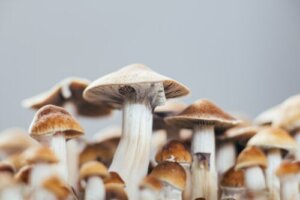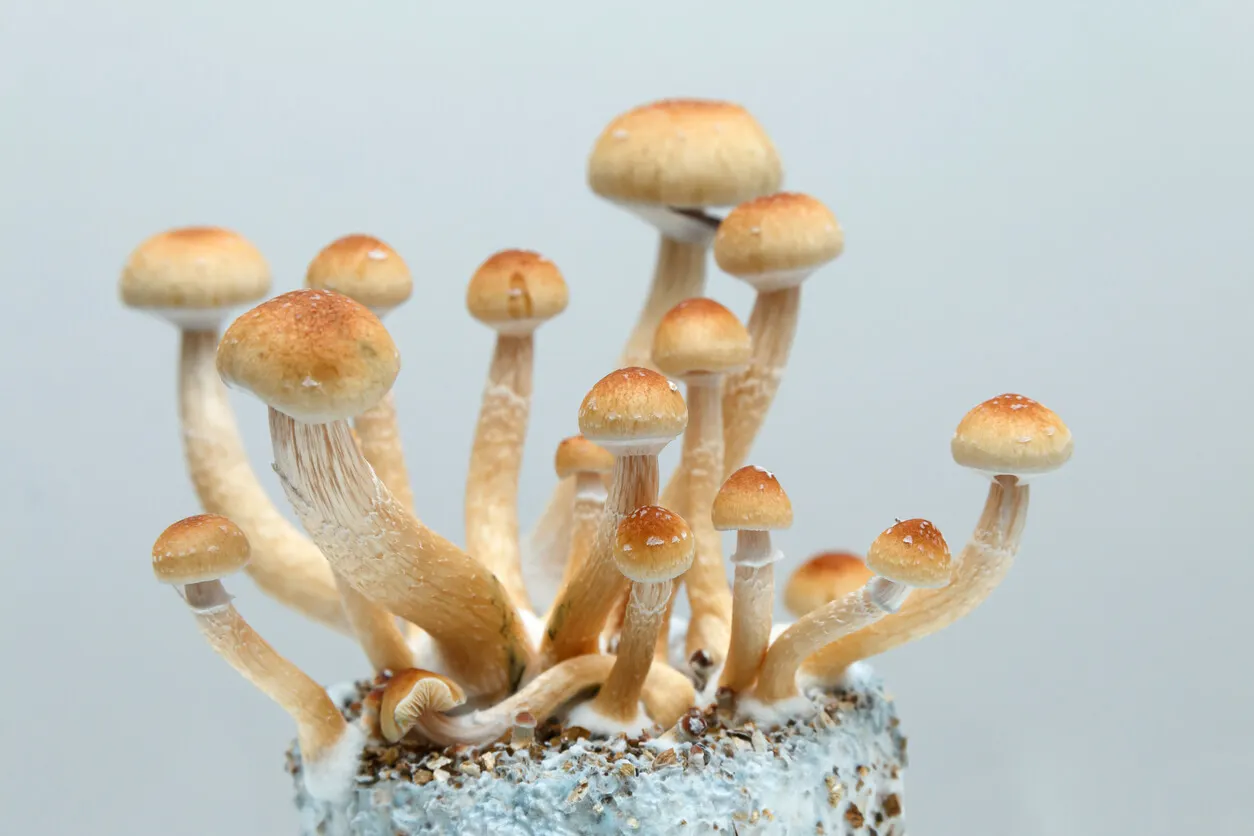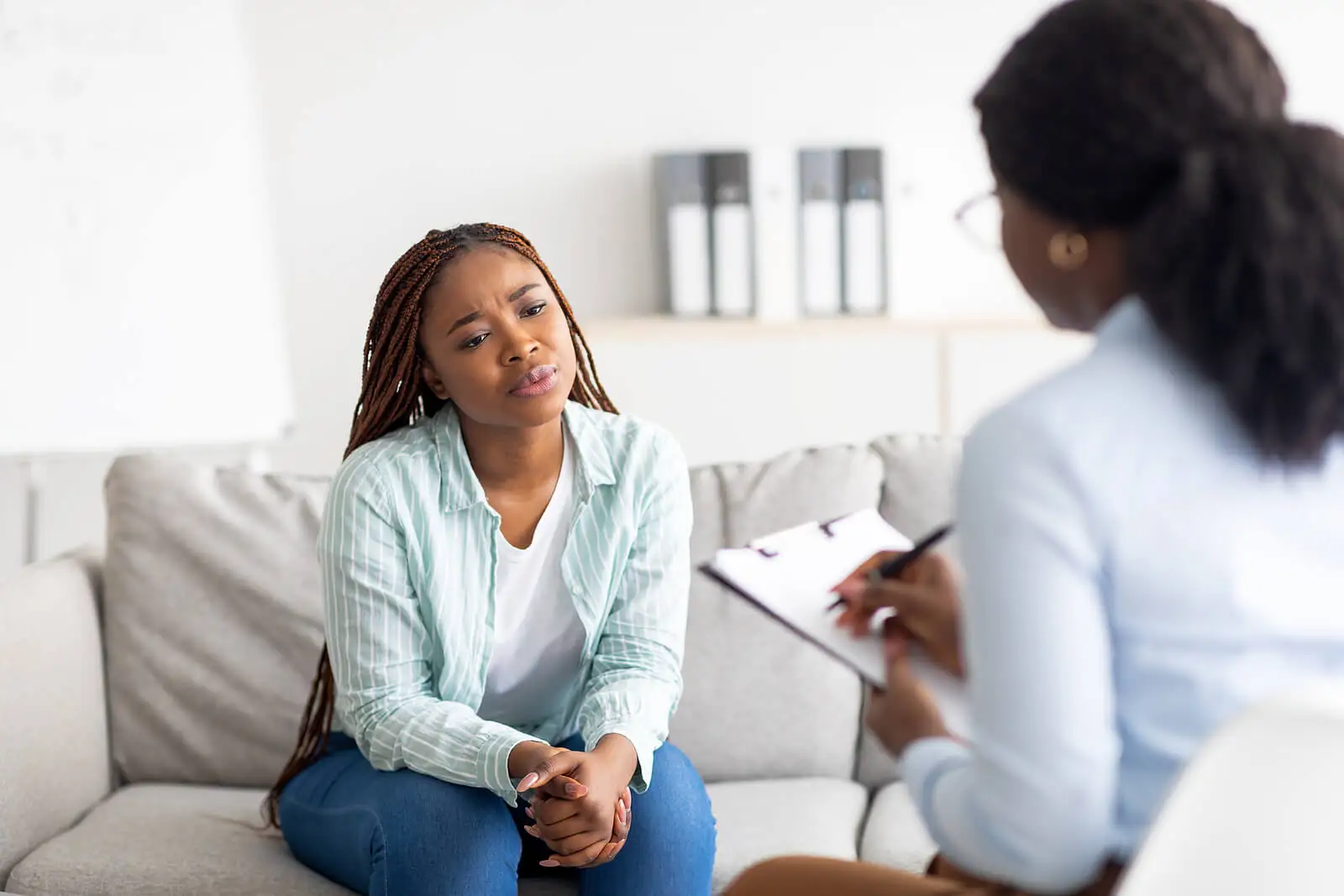Psilocybin Against Depression: What Are Its Effects?


Reviewed and approved by the pharmacist Franciele Rohor de Souza
The effects of psilocybin against depression have been the subject of research in recent years. This psychedelic compound is present in “magic mushrooms” (Psilocybe cubensis) of which there are estimated to be about 100 species.
A recent study reported in the journal Nature Medicine suggests that this substance has therapeutic potential against symptoms of major depression and other mood disorders. However, its use is limited by legality and safety issues. We’ll tell you all the details below.
What is psilocybin?
Psilocybin is one of the main compounds in magic mushrooms, along with psilocin. It’s classified as “psychedelic”, as it’s responsible for causing hallucinations and other psychoactive effects after its consumption.
Beyond this, it’s a substance that people have attributed therapeutic properties to, due to its stimulant effect on the brain. And, although its use comes from indigenous traditions, in recent years it has been the subject of interest for scientific research.
Thus, researchers have observed that its assimilation contributes to the decrease of activity in the medial prefrontal cortex and posterior cingulate cortex, which contributes to the control of depressive states.
In ancestral indigenous medicine, magic mushrooms with psilocybin are dried before their use. They are then ingested in mixtures with food or drink. Its effects take up to 30 minutes to onset and last up to 6 hours.
As with other types of hallucinogens, its clinical use is limited by the Controlled Drugs and Substances Act. It’s one of the Schedule 1 drugs, which warns that there’s a high risk of abuse. For this reason, its medical application was disapproved for a long time as a treatment in the United States.
Despite this, in recent years there has been a resurgence of studies on its pharmacological effects, the results of which link its use with positive actions against depression, anxiety, anorexia, obsessive-compulsive disorder and various forms of substance abuse.
Due to evidence gathered in several clinical trials, the Food and Drug Administration (FDA) designated psilocybin as a “breakthrough therapy” against severe depression.

Read also: Phantosmia: How Do Olfactory Hallucinations Occur?
Psilocybin research against depression
The potential of psilocybin as an adjuvant in the field of psychiatry has been studied since the 1950s. Since then, researchers have observed that this substance has antidepressant qualities, which may support the treatment of various psychiatric disorders.
Limitations in conducting research began to emerge in 1970, after the substance was placed on Schedule 1 of the Controlled Drugs and Substances Act. This limited federal funding for research, which prevented trials for a long time.
But following a series of experiments done in 2012, researcher Robin Carhart-Harris and his team at the Imperial College of London became interested again in evaluating the therapeutic potential of psilocybin. Thus, in 2016, promising clinical trials were conducted.
The study reported in the journal The Lancet Psychiatry reported that two doses of psilocybin, along with psychiatric therapy, can significantly decrease symptoms of depression. It was also found to cause notable, sustained improvements in anxiety and anhedonia.
To conduct the trial, the researchers looked at the effects of psilocybin in a group of 12 patients with major depression (six men and six women). These received oral doses of the substance, in values of 10 mg and 25 mg, 7 days apart. In addition, psychological support was provided before, during, and after each intake. Depressive symptoms were evaluated between 1 week and 3 months after treatment.
All patients exhibited a considerable reduction in depressive symptoms.
Recent studies
The most recent studies on psilocybin against depression confirm its potential as an antidepressant. In research reported in the Journal of Psychopharmacology it was reported that treatment with psilocybin favors the relief of major depression, with effects that last up to 12 months.
In turn, in the New England Journal of Medicine it was revealed that a single dose of a synthetic version of psilocybin was useful to control depressive symptoms in people with a treatment-resistant version of the disease. The latter occurs when there’s no response to the effects of regular antidepressants.
This latest trial involved 223 patients, in which doses of 1 milligram, 10 milligrams and 25 milligrams were used. In the end, the strongest dose, 25 milligrams, was reported to be the most effective, with effects lasting up to 3 months.
Risks and side effects of psilocybin
In most healthy adults, psilocybin has been well tolerated when used in controlled settings, in one or two doses. Even so, it shouldn’t be ignored that this substance can induce various side effects. These may be mild or moderate and include the following:
- Nausea
- Paranoia
- Hallucinations
- Headaches
- Confusion and fear
- Muscle weakness
- High blood pressure
- Lack of coordination
- Alteration of cardiac rhythm
It isn’t recommended for use in patients with mental illnesses such as schizophrenia, as it’s is feared that it may exacerbate symptoms. Neither should it be taken simultaneously with serotonergic and other stimulant drugs.
On the other hand, the recreational use of psilocybin magic mushrooms should be avoided. This is because the amount of this substance may vary in each type, making it difficult to know the intensity and duration of the final effects.
Because they aren’t taken in a controlled environment, such ingestions increase the chances of unwanted reactions.
Not to mention that these mushrooms have characteristics similar to poisonous mushrooms, which increases the risk of poisoning and more serious consequences, such as organ damage or even death.

Discover more: What Is CBD Shampoo and What Are Its Benefits?
What to remember about psilocybin therapy?
The antidepressant potential of psilocybin therapy has been corroborated by some recent clinical trials. Even so, it should be kept in mind that it’s a substance whose effects are still under investigation. There isn’ enough evidence to consider it a first-choice treatment for depression.
Some companies are currently developing commercial forms of psilocybin. And although some U.S. states are legalizing its therapeutic use, the substance remains in Schedule I of the Controlled Substances Act.
Experts also caution that patients with depression shouldn’t self-medicate with psilocybin through the consumption of magic mushrooms or supplements. In the absence of dosage control, there’s a high risk of unwanted effects.
All cited sources were thoroughly reviewed by our team to ensure their quality, reliability, currency, and validity. The bibliography of this article was considered reliable and of academic or scientific accuracy.
- Bienemann B, Ruschel NS, Campos ML, Negreiros MA, Mograbi DC. Self-reported negative outcomes of psilocybin users: A quantitative textual analysis. PLoS One. 2020 Feb 21;15(2):e0229067. doi: 10.1371/journal.pone.0229067. PMID: 32084160; PMCID: PMC7034876.
- Carhart-Harris, R. L., Bolstridge, M., Rucker, J., Day, C. M. J., Erritzoe, D., Kaelen, M., Bloomfield, M., Rickard, J. A., Forbes, B., Feilding, A., Taylor, D., Pilling, S., Curran, V. H., & Nutt, D. J. (2016). Psilocybin with psychological support for treatment-resistant depression: an open-label feasibility study. In The Lancet Psychiatry (Vol. 3, Issue 7, pp. 619–627). Elsevier BV. https://doi.org/10.1016/s2215-0366(16)30065-7
- Daws, R.E., Timmermann, C., Giribaldi, B. et al. Increased global integration in the brain after psilocybin therapy for depression. Nat Med 28, 844–851 (2022). https://doi.org/10.1038/s41591-022-01744-z
-
Eisenstein M. The psychedelic escape from depression. Nature. 2022 Sep;609(7929):S87-S89. doi: 10.1038/d41586-022-02872-9. PMID: 36171370.
- Goodwin GM, Aaronson ST, Alvarez O, Arden PC, Baker A, Bennett JC, Bird C, Blom RE, Brennan C, Brusch D, Burke L, Campbell-Coker K, Carhart-Harris R, Cattell J, Daniel A, DeBattista C, Dunlop BW, Eisen K, Feifel D, Forbes M, Haumann HM, Hellerstein DJ, Hoppe AI, Husain MI, Jelen LA, Kamphuis J, Kawasaki J, Kelly JR, Key RE, Kishon R, Knatz Peck S, Knight G, Koolen MHB, Lean M, Licht RW, Maples-Keller JL, Mars J, Marwood L, McElhiney MC, Miller TL, Mirow A, Mistry S, Mletzko-Crowe T, Modlin LN, Nielsen RE, Nielson EM, Offerhaus SR, O’Keane V, Páleníček T, Printz D, Rademaker MC, van Reemst A, Reinholdt F, Repantis D, Rucker J, Rudow S, Ruffell S, Rush AJ, Schoevers RA, Seynaeve M, Shao S, Soares JC, Somers M, Stansfield SC, Sterling D, Strockis A, Tsai J, Visser L, Wahba M, Williams S, Young AH, Ywema P, Zisook S, Malievskaia E. Single-Dose Psilocybin for a Treatment-Resistant Episode of Major Depression. N Engl J Med. 2022 Nov 3;387(18):1637-1648. doi: 10.1056/NEJMoa2206443. PMID: 36322843.
-
Gukasyan N, Davis AK, Barrett FS, Cosimano MP, Sepeda ND, Johnson MW, Griffiths RR. Efficacy and safety of psilocybin-assisted treatment for major depressive disorder: Prospective 12-month follow-up. J Psychopharmacol. 2022 Feb;36(2):151-158. doi: 10.1177/02698811211073759. PMID: 35166158; PMCID: PMC8864328.
- Lowe H, Toyang N, Steele B, Valentine H, Grant J, Ali A, Ngwa W, Gordon L. The Therapeutic Potential of Psilocybin. Molecules. 2021 May 15;26(10):2948. doi: 10.3390/molecules26102948. PMID: 34063505; PMCID: PMC8156539.
- Carhart-Harris, R., Goodwin M., (2017). The Therapeutic Potential of Psychedelic Drugs: Past, Present, and Future. Neuropsychopharmacology. Doi: 10.1038/npp.2017.84
This text is provided for informational purposes only and does not replace consultation with a professional. If in doubt, consult your specialist.








